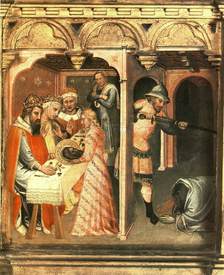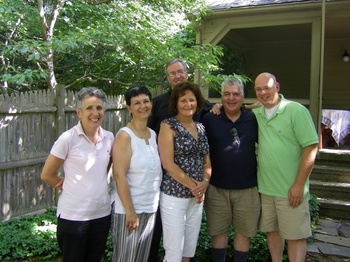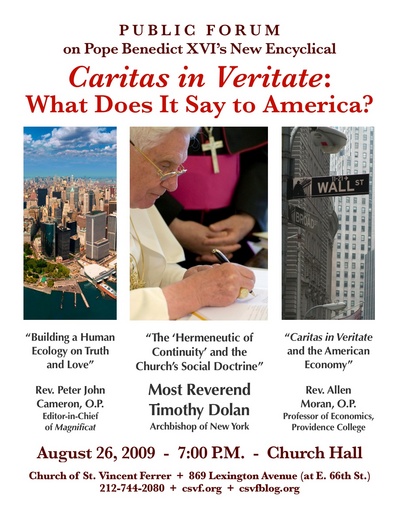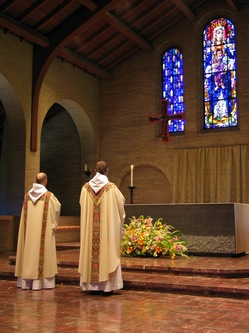 Over the years New Haven area Catholics have nurtured the vocations of many men to the priesthood or religious life. In the coming days I am hoping to write more about those who have said "yes" to the Lord in His call to religious life and priesthood. But for the moment let me note here those from the New Haven area that are studying for a religious order or a diocese:
Over the years New Haven area Catholics have nurtured the vocations of many men to the priesthood or religious life. In the coming days I am hoping to write more about those who have said "yes" to the Lord in His call to religious life and priesthood. But for the moment let me note here those from the New Haven area that are studying for a religious order or a diocese:August 2009 Archives
 Over the years New Haven area Catholics have nurtured the vocations of many men to the priesthood or religious life. In the coming days I am hoping to write more about those who have said "yes" to the Lord in His call to religious life and priesthood. But for the moment let me note here those from the New Haven area that are studying for a religious order or a diocese:
Over the years New Haven area Catholics have nurtured the vocations of many men to the priesthood or religious life. In the coming days I am hoping to write more about those who have said "yes" to the Lord in His call to religious life and priesthood. But for the moment let me note here those from the New Haven area that are studying for a religious order or a diocese: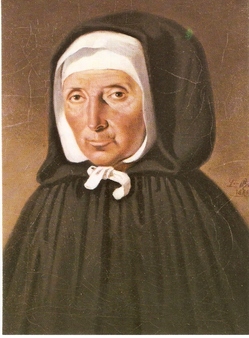
We beseech Thee, O Lord our God, grant us to revere with unceasing devotion the glorious victories of Thy holy Martyrs Saints Margaret Clitherow, Anne Line and Margaret Ward; may we at least honor with our lowly homage those whose praises we cannot sing worthily.
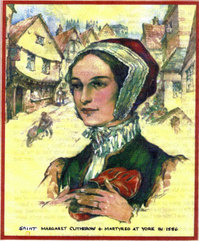
Saint Margaret Middleton was born in York in 1556, lived there all her life, and died there on 25 March 1586. At 15, she married a butcher, John Clitherow, and three years later became a Catholic. Imprisoned for her non-attendance at church, she taught herself to read and later ran a small school for her own and her neighbours' children. Her husband remained Protestant, but allowed her to hide priests in their house. In 1586, the secret hiding places were discovered, and Margaret was put on trial. She refused to plead, for which the punishment was being crushed to death.
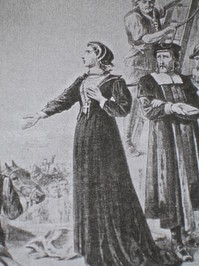
Saint Anne Heigham was born at Dunmow (Essex) around 1565, and was hanged at Tyburn on 27 February 1601. In her teens, she became a Catholic and was disinherited, and in 1585 married Roger Line, also a disinherited convert, who was subsequently imprisoned then exiled for his faith, leaving her destitute. She taught and embroidered, and also kept house for priests. After a large number of people had been seen gathering at her house for Mass, she was arrested, tried and condemned to death.
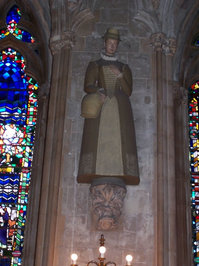
Saintt Margaret Ward was born at Congleton (Cheshire), but entered into the service of a family in London. She was arrested after assisting a priest escape from prison, but refused under severe torture to reveal his hiding place or to renounce her faith. She was tried at the Old Bailey, and executed on this day in 1588. All three are remembered for their resourcefulness, for their loyalty, for their outstanding courage, and for the service they rendered the Church during dangerous times in aiding the ministry of priests. (Liturgy Office, Bishops of England & Wales)
For more on these 3 English Martyrs see this entry.
In the Diocese of Bridgeport, those who prepare for the major seminary at Saint John Fisher Seminary, Stamford, call to mind the martyrdom of these women saints daily as their statues surround the altar. May Saints Margaret, Anne and Margaret, pray for us!!!
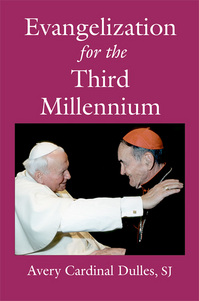 Cardinal Avery Dulles is still producing intellectual stimulation. Due to be released next week is Evangelization for the Third Millennium (Paulist Press), the final work that he had already in progress during what became the Cardinal's final months.
Cardinal Avery Dulles is still producing intellectual stimulation. Due to be released next week is Evangelization for the Third Millennium (Paulist Press), the final work that he had already in progress during what became the Cardinal's final months.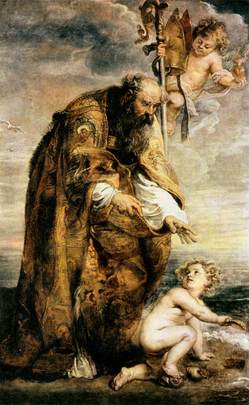 O blest teacher, light of holy Church, blessed Augustine thou lover of God's law, plead with the Son of God for us.
O blest teacher, light of holy Church, blessed Augustine thou lover of God's law, plead with the Son of God for us.St Augustine, whom we are commemorating today, has some marvellous thoughts about the invitation found in Psalm 105[104]: "Quaerite faciem eius semper - constantly seek his face" (v. 3).
He points out that this invitation is not only valid for this life but also for eternity. The discovery of "God's Face" is never ending. The further we penetrate into the splendour of divine love, the more beautiful it is to pursue our search, so that "amore crescente inquisitio crescat inventi - the greater love grows, the further we will seek the One who has been found" (Enarr. in Ps 105[104]: 3; CCL 40, 1537).
This is the experience to which, deep down,
we too aspire. May the intercession of the great Bishop of Hippo obtain it for
us! May the motherly help of Mary, the Star of Evangelization whom we now
invoke with the prayer of the Angelus, obtain it for us. (Pope Benedict XVI, 28 August 2005, Angelus)
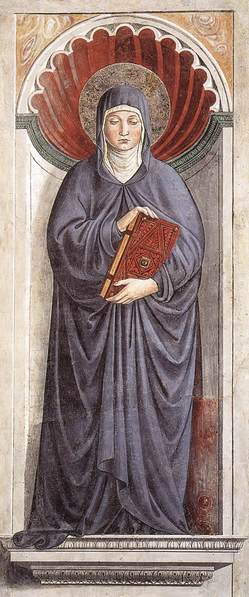 Give unto her of the fruit of her own hands, and let her works praise her in the gates, alleluia.
Give unto her of the fruit of her own hands, and let her works praise her in the gates, alleluia.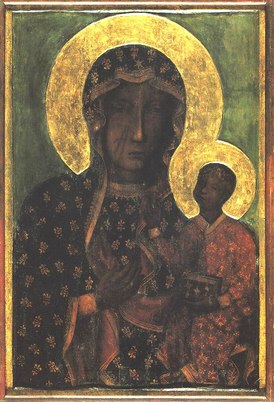 A Morning Prayer to
A Morning Prayer to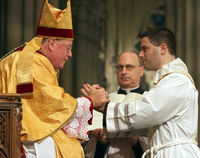 ... the character of the Good Shepherd is branded on your hearts.. at ordination.
... the character of the Good Shepherd is branded on your hearts.. at ordination. 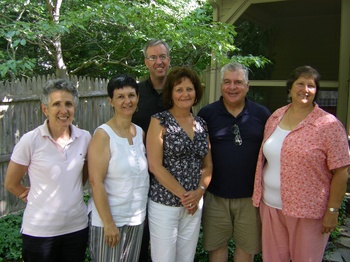
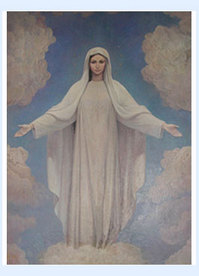 On the premise that the faithful require the truth, I am still wondering about the authenticity of the apparitions of the Blessed Mother at Medjugorje, especially with how one pope dealt with the cult and how the current pope is dealing with it. At the end of July I posted a question about the possibility of the apparitions being a hoax with the reduction to the lay state of the Franciscan priest who promoted the apparitions. With 30 million+ pilgrims since the messages were revealed, there seems to be some continued interest among the Church, Mariologists, and the faithful. I think we all need the discernment of the Church.
On the premise that the faithful require the truth, I am still wondering about the authenticity of the apparitions of the Blessed Mother at Medjugorje, especially with how one pope dealt with the cult and how the current pope is dealing with it. At the end of July I posted a question about the possibility of the apparitions being a hoax with the reduction to the lay state of the Franciscan priest who promoted the apparitions. With 30 million+ pilgrims since the messages were revealed, there seems to be some continued interest among the Church, Mariologists, and the faithful. I think we all need the discernment of the Church.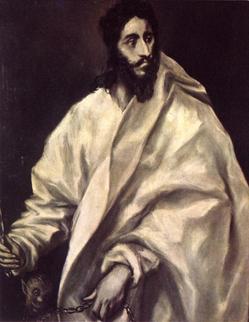

Hey!!! Follow
the progress of the 30th Rimini Meeting working under the theme of Knowledge is always an event. Particularly
fascinating to me are the photos of the events which speak a 1000 words.
Remember to keep the Meeting in your daily prayer to the Holy Spirt: It's
an opportunity to meet Christ! Given the hard and beautiful of work that has
transpired over three decades in putting the Meeting together, a 2-part video
presentation takes us through the highlights. See 30 years of the Rimini
Meeting: A Review --part 1
and part 2. If
you care to watch some of the Meeting on TV
if you can manage Italian and Spanish. Take a look at what's on deck for the
program and notice the variety of speakers... the program can
be found here which I recommend your perusing. Pope Benedict XVI
said at the Angelus: "Today the 30th edition of the 'Meeting for
Friendship Among Peoples' has opened in Rimini, [Italy], taking as its
title 'Knowledge Is Always an Event.' In addressing a cordial greeting to those
who are taking part in this significant gathering, I hope that it will be a
propitious occasion for understanding that '[k]nowing is not simply a material
act, since ... [i]n all knowledge and in every act of love the human soul
experiences something 'over and above,' which seems very much like a gift that
we receive, or a height to which we are raised' (Caritas in Veritate, No.
77)."
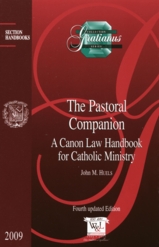
Canon law isn't the most scintillating subject for most Catholics, even for priests, but it's a necessary science in our ecclesial existence. I am happy to let you know that the fourth edition, revised and updated, of Dr. John Huels' The Pastoral Companion, has been published by Wilson & Lafleur of Montreal in the Gratianus Series.
A link to the Table of Contents at the above link will demonstrate the topics covered. It seems to me that all pastoral ministers need this book.
It's on the website, www.wilsonlafleur.com, on the link for "new releases" or just follow the link above which may be easier.
The author was a professor mine at the University of Notre Dame and is quite good in his scholarship and pastoral insight.
Funny, my 1000th post is on a book on canon law.
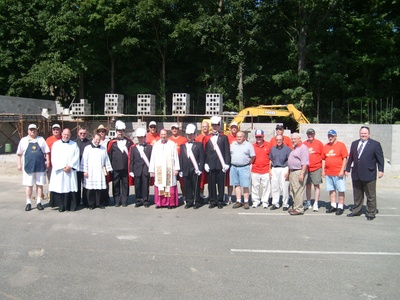
On Saturday August 16th Bishop Lori blessed the grounds of the new Council 185 Meeting and Storage building which will be named Moritz Hall.
The Moritz Hall derives its name from PGK Len Moritz who has been a major force assuring completion of this four year project.
The hot day was part of a
Saint Rose of Lima (Newtown, CT) hosted Fan the Fire Youth Rally. Over 600 teens from all
over the diocese spent the day participating in renewal, witness and
confession. The day ended with a sunset Mass celebrated by Bishop Lori,
Monsignor Robert Weiss and a host of concelebrants. Vivat Jesus!
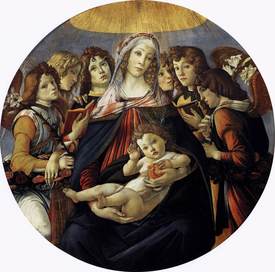
A Solemn Act of Consecration to the Immaculate Heart of Mary
Most Holy Virgin Mary, tender Mother of men, to fulfill the desires of the Sacred Heart of Jesus and the request of the Vicar of Your Son on earth, we consecrate ourselves and our families to your Sorrowful and Immaculate Heart, O Queen of the Most Holy Rosary, and we recommend to You, all the people of our country and all the world.
Please accept our consecration, dearest Mother, and use us as You wish to accomplish Your designs in the world.
O Sorrowful and Immaculate Heart of Mary, Queen of the Most Holy Rosary, and Queen of the World, rule over us, together with the Sacred Heart of Jesus Christ, Our King. Save us from the spreading flood of modern paganism; kindle in our hearts and homes the love of purity, the practice of a virtuous life, an ardent zeal for souls, and a desire to pray the Rosary more faithfully.
We come with confidence to You, O Throne of Grace and Mother of Fair Love. Inflame us with the same Divine Fire which has inflamed Your own Sorrowful and Immaculate Heart. Make our hearts and homes Your shrine, and through us, make the Heart of Jesus, together with your rule, triumph in every heart and home. Amen.
Venerable
Servant of God Pope Pius XII
 The US Bishops' Committee on Divine Worship launched a new website today (on the liturgical memorial of St Pius X, no less!!!) that pulls together tons of info on the proposed new translation of the Novus Ordo Mass. The aim of the website is to educate us on the forthcoming Roman Missal. All I can say at the moment: THANKS BE TO GOD! What I've seen of the work on the this website looks pretty good and I look forward to more. Poke around...and familiarize yourself with what the Church is proposing in terms of praying the Mass. Notice that we are no longer calling the "big red book used at Mass by the priest" the "sacramentary" but the Roman Missal. The first step is a good one.
The US Bishops' Committee on Divine Worship launched a new website today (on the liturgical memorial of St Pius X, no less!!!) that pulls together tons of info on the proposed new translation of the Novus Ordo Mass. The aim of the website is to educate us on the forthcoming Roman Missal. All I can say at the moment: THANKS BE TO GOD! What I've seen of the work on the this website looks pretty good and I look forward to more. Poke around...and familiarize yourself with what the Church is proposing in terms of praying the Mass. Notice that we are no longer calling the "big red book used at Mass by the priest" the "sacramentary" but the Roman Missal. The first step is a good one.
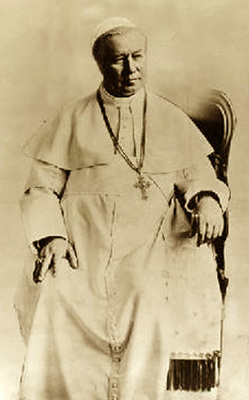 Yes, Lord; you know that I love You.
Yes, Lord; you know that I love You.On the feast of Saint Lawrence (August 10), the Cardinal Prefect of the Congregation for Clergy, Claudio Cardinal Hummes, OFM, wrote to the world's permanent deacons that what the Year of the Priest is also oriented toward the Order of Deacon and what is said to the priests applies very much to the deacons. This is welcome news!
I admire the vocation of deacons but I have had my fill of deacons who believe their vocation is undervalued, mis-understood or abused by priests. While there are tensions among some deacons and priests, the problem is often grossly reported. In recent weeks since the pope inaugurated the Year of the Priest I have heard deacons complaining that they feel "left out" by not having a spiritual/intellectual year dedicated to them as one is to the priesthood. The moaning distracts. Complaining is rather
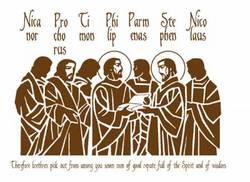
tedious when you see the connections among the various hierarchies in our Church because none can exist without the other (even though the Church didn't have the permanent deaconate for long a period of time). Look at the witnesses of the sainted deacons through the millennia: Stephen, Ephrem, Francis among many. Quoting Pope "to work in favor of this pull of priests toward spiritual perfection, upon which, above all, depends the efficacy of their ministry," (discourse of March 16, 2009). Hence, I am happy to see something on the value of the permanent deacons in the Year of the Priest because the call and ministry of priests and deacons are intimately interrelated as is the call to the episcopacy in the service of the Gospel. Additionally, I am elated the Cardinal once again drew our attention to the need to know our Scripture and the practice of lectio divina. Proper and ongoing formation in the Lord and the Church requires careful attention to the place of Scripture and lectio. The letter said in part:
To know Revelation, to adhere unconditionally to Jesus Christ as a fascinated and enamored disciple, to base oneself always upon Jesus Christ and to be with Him in our Mission, this is then what awaits a permanent deacon, decisively and without any reservation. From a good disciple a good missionary is born.
The ministry of the Word which, in a special way for Deacons, has as its great model St. Stephen, Deacon and Martyr, requires of ordained ministers a constant struggle to study it and carry it out, at the same time as one proclaims it to others. Meditation, following the style of lectio divina, that is, prayerful reading, is one well traveled and much counseled way to understand and live the Word of God, and make it ones own. At the same time, intellectual, theological and pastoral formation is a challenge which endures throughout life. A qualified and up to date ministry of the Word very much depends upon this in depth formation.
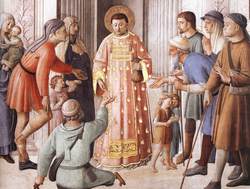
The second reflection regards the ministry of Charity, taking as a great model St. Lawrence, Deacon and Martyr. The diaconate has its roots in the early Church's efforts to organize charitable works. At Rome, in the third century, during a period of great persecution of Christians, the extraordinary figure of St. Lawrence appears. He was archdeacon of Pope Sixtus II, and his trustee for the administration of the goods of the community. Our well beloved Pope Benedict XVI says regarding St. Lawrence: "His solicitude for the poor, his generous service which he rendered to the Church of Rome in the area of relief and of charity, his fidelity to the Pope, from him he was thrust forward to the point of wanting to undergo the supreme test of martyrdom and the heroic witness of his blood, rendered only a few days later. These are universally recognized facts." (Homily Basilica of St. Lawrence, November 30, 2008). From St. Lawrence we also take note of the affirmation "the riches of the Church are the poor." He assisted the poor with great generosity. He is thus an ever more present example to permanent deacons. We must love the poor in a preferential way, as did Jesus Christ; to be united with them, to work towards constructing a just, fraternal and peaceful society. The recent encyclical letter of Benedict XVI, Caritas in Veritate (Charity in Truth), should be our updated guide. In this encyclical the Holy Father affirms as a fundamental principle "Charity is the royal road of the social doctrine of the Church" (n. 2). Deacons must identify themselves in a very special way with charity. The poor are part of your daily ambiance, and the object of your untiring concern. One could not understand a Deacon who did not personally involve himself in charity and solidarity toward the poor, who again today are multiplying in number.
Yesterday's general audience (August 19, 2009) Pope Benedict took the opportunity to draw our attention to the saint being memorialized in the Liturgy, Saint John Eudes, as a model for personal renewal which will lead to the renewal of the priesthood. The zeal, the desire for the face of God, the need for conversion will lead, I am convinced, not only the renewal of the priesthood (and seminarians) but also the entire Church. Christ is the one thing we are seeking, the one person we are seeking. As the Baptist said, "He must increase; I must decrease." AND focus on CHRIST!!!!! Read a portion of the Pope's address.
While contempt was being spread for the Christian faith by some currents of thought that were prevalent then, the Holy Spirit inspired a fervent spiritual renewal, with prominent personalities such as that of Berulle, St. Vincent de Paul, St. Louis Mary Grignion de Montfort and St. John Eudes. This great "French school" of holiness also had St. John Mary Vianney among its fruits. By a mysterious design of Providence, my venerated predecessor, Pius XI, proclaimed John Eudes and the Curé d'Ars saints at the same time, on May 31, 1925, offering the Church and the whole world two extraordinary examples of priestly holiness.
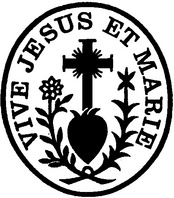
In the context of the Year for Priests, I wish to pause to underline the apostolic zeal of St. John Eudes, directed in particular to the formation of the diocesan clergy.
The saints have verified, in the experience of life, the truth of the Gospel; in this way, they introduce us into the knowledge and understanding of the Gospel. In 1563, the Council of Trent issued norms for the establishment of diocesan seminaries and for the formation of priests, as the council was aware that the whole crisis of the Reformation was also conditioned by the insufficient formation of priests, who were not adequately prepared intellectually and spiritually, in their heart and soul, for the priesthood.
This occurred in 1563 but, given that the application and implementation of the norms took time, both in Germany as well as in France, St. John Eudes saw the consequences of this problem. Moved by the lucid awareness of the great need of spiritual help that souls were feeling precisely because of the incapacity of a great part of the clergy, the saint, who was a parish priest, instituted a congregation dedicated specifically to the formation of priests. He founded the first seminary in the university city of Caen, a highly appreciated endeavor, which was soon extended to other dioceses.
The path of holiness he followed and proposed to his disciples had as its foundation a solid confidence in the love that God revealed to humanity in the priestly Heart of Christ and the maternal Heart of Mary. In that time of cruelty and loss of interior silence, he addressed himself to the heart so as to leave in the heart a word from the Psalms very well interpreted by St. Augustine. He wanted to remind people, men and above all future priests of the heart, showing the priestly Heart of Christ and the maternal Heart of Mary. A priest must be a witness and apostle of this love of the Heart of Christ and of Mary.
Today we also feel the need for priests to witness the infinite mercy of God with a life totally "conquered" by Christ, and for them to learn this in the years of their formation in the seminaries. After the synod of 1990, Pope John Paul II issued the apostolic exhortation Pastores Dabo Vobis, in which he took up and actualized the norms of the Council of Trent and above all underlined the need for continuity between the initial and permanent moments of formation. For him, for us, this is a real point of departure for a genuine reform of priestly life and apostolate, and it is also the central point so that the "new evangelization" is not simply an attractive slogan, but rather is translated into reality.
The foundations of formation in the seminary constitute that irreplaceable "humus spirituale" in which it is possible to "learn Christ," allowing oneself to be progressively configured to him, sole High Priest and Good Shepherd. The time in the seminary should be seen, therefore, as the actualization of the moment in which the Lord Jesus, after having called the Apostles and before sending them out to preach, asks that they stay with him (cf. Mark 3:14).
When St. Mark narrates the vocation of the Twelve Apostles, he tells us that Jesus had a double objective: The first was that they be with him, the second that they be sent to preach. But in going always with him, they truly proclaim Christ and take the reality of the Gospel to the world.
In this Year for Priests, I invite you to pray,
dear brothers and sisters, for priests and for those preparing to receive the
extraordinary gift of the priestly ministry. I conclude by addressing to all
the exhortation of St. John Eudes, who said thus to priests: "Give
yourselves to Jesus to enter into the immensity of his great Heart, which
contains the Heart of his Holy Mother and of all the saints, and to lose
yourselves in this abyss of love, of charity, of mercy, of humility, of purity,
of patience, of submission and of holiness" (Coeur admirable, III, 2).
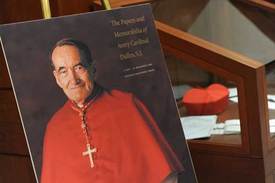 Recently, Fordham University's Walsh Library, in collaboration
with one of Cardinal Avery Dulles' closest collaborators, Dominican Sister
Ann-Marie Kirmse, displayed many of the cardinal's possessions. It brings together the many intimate things of Avery Dulles who died 12 December.
Recently, Fordham University's Walsh Library, in collaboration
with one of Cardinal Avery Dulles' closest collaborators, Dominican Sister
Ann-Marie Kirmse, displayed many of the cardinal's possessions. It brings together the many intimate things of Avery Dulles who died 12 December.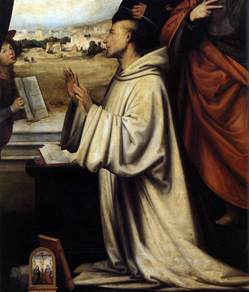
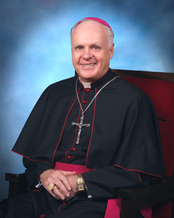 John Allen explores this question in a recent article. Archbishop Edwin F. O'Brien is the 15th archbishop of Baltimore, a New York native, and an affable man with a prayer life and a sense of humor. A former spiritual father of mine worked with the archbishop at the North American College (Rome) and spoke very highly of O'Brien's character, ability to work and his capacity for friendship.
John Allen explores this question in a recent article. Archbishop Edwin F. O'Brien is the 15th archbishop of Baltimore, a New York native, and an affable man with a prayer life and a sense of humor. A former spiritual father of mine worked with the archbishop at the North American College (Rome) and spoke very highly of O'Brien's character, ability to work and his capacity for friendship.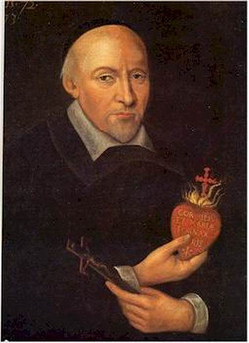 ...that Christ may dwell in your hearts through faith.
...that Christ may dwell in your hearts through faith.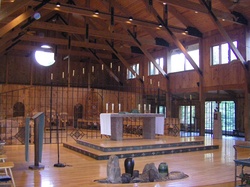 One of the blessings in Connecticut is the presence of Abbey of Regina Laudis, a monastery of nearly 40 Benedictine nuns in the hills of Litchfield, County (in the Archdiocese of Hartford). Looking out in the choir there were 5 white veil novices and 1 postulant among the other professed nuns.
One of the blessings in Connecticut is the presence of Abbey of Regina Laudis, a monastery of nearly 40 Benedictine nuns in the hills of Litchfield, County (in the Archdiocese of Hartford). Looking out in the choir there were 5 white veil novices and 1 postulant among the other professed nuns.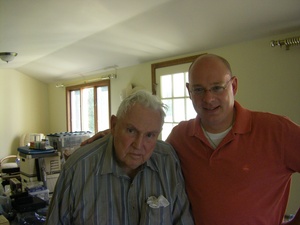 You never know who will bless a house. Today, a friend's house was blessed by his uncle, Archbishop Peter Leo Gerety, emeritus archbishop of Newark. The Gerety's nephew, Phil, was a most gracious host today.
You never know who will bless a house. Today, a friend's house was blessed by his uncle, Archbishop Peter Leo Gerety, emeritus archbishop of Newark. The Gerety's nephew, Phil, was a most gracious host today.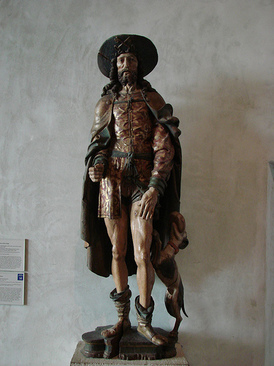
See the beauty of the daughter of Jerusalem, who ascended to heaven like the rising sun at dawn.
The ark which God has sanctified,
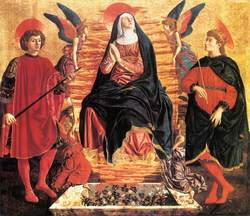
Which He has filled with grace,
Within the temple of the Lord
Has found a resting-place.
More glorious than the seraphim,
This ark of love divine,
Corruption could not blemish her
Whom death could not confine.
God-bearing Mother, Virgin chaste,
Who shines in heaven's sight;
She wears a royal crown of stars
Who is the door of Light.
To Father, Son and Spirit blest
may we give endless praise
With Mary, who is Queen of heaven,
Through everlasting days.
(from Stanbrook Abbey Hymnal)
Prayer for the Canonization of
Father Michael J. McGivney
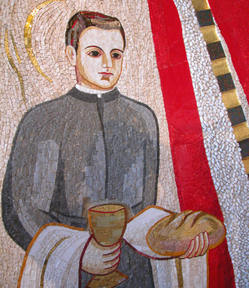
God, our Father, protector of the poor and defender of the widow and orphan, you called your priest, Father Michael J. McGivney, to be an apostle of Christian family life and to lead the young to the generous service of their neighbor.
Through the example of his life and virtue may we follow your Son, Jesus Christ, more closely, fulfilling his commandment of charity and building up his Body which is the Church. Let the inspiration of your servant prompt us to greater confidence in your love so that we may continue his work of caring for the needy and the outcast.
We humbly ask that you glorify your servant Father Michael J. McGivney on earth according to the design of your holy will.
Through his intercession, grant the favor I now present (here make your request).
Through Christ our Lord. Amen.
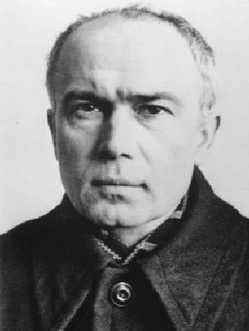 We know that we have passed out of death into life,
because we love the brethren. He who does not love abides in death.
We know that we have passed out of death into life,
because we love the brethren. He who does not love abides in death.Another version of a blessing of herbs or flowers on the Solemnity of the Assumption. In this case though, the blessing is taken from the Byzantine ritual and so we ought to say the "Dormition", this is the proper term in the East for what the Latins call the Assumption of Mary.
O almighty, eternal God, by your word alone You created out
of nothing the heavens, earth, sea, and all things visible and invisible. You
commanded that the earth give forth plants and trees for the needs of man and
animal, each according to its need. In your infinite goodness You ordained that
these plants serve not only as food for the animals but also as medicine for
the sick body. We beseech you, bless these different plants and fruits and
bestow upon them your blessing, and endow them with your power, so that they
may serve man and animal like as a defense against all sickness and all that is
impure: for You are our God and we give glory to You, Father, Son, and Holy
Spirit, now and ever, and forever. Amen.
These flowers (or: plants) are blessed and sanctified by the sprinkling of this holy water in the name of the Father, and of the Son, and of the Holy Spirit. Amen.
It is customary in the Western Church, since at least the 10th century, for the priest to bless herbs on the Solemnity of the Assumption. The Eastern Church likely had a similar formulary much earlier.
As a point of liturgical fact, the Church asks God to bless herbs and flowers --and thus us-- to remind all of us of the gifts God has given us for our sustenance, healing and beauty. In many places the faithful had all their flowers blessed, especially those closely associated with the Blessed Virgin Mary. Herbs blessing, therefore, is another example of giving thanks, a key theological and liturgical point in our life of faith. While customary it is not likely to be used in many parishes. The collects for the herbs blessing rich and savory.
The Directory on Popular Piety and the Liturgy (2001) says of herbs blessing:
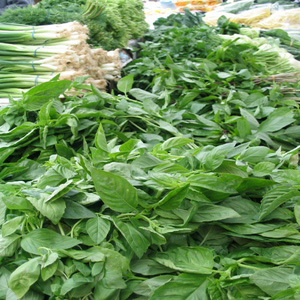
The Assumption of the Blessed Virgin Mary (15 August) is deeply imbedded in popular piety. In many places the feast is synonymous with the person of Our Lady, and is simply referred to as "Our Lady's Day" or as the "Immacolada" in Spain and Latin America.
In the Germanic countries, the custom of blessing herbs is associated with 15 August. This custom, received into the Rituale Romanum (200), represents a clear example of the genuine evangelization of pre-Christian rites and beliefs: one must turn to God, through whose word "the earth produced vegetation: plants bearing seeds in their several kinds, and trees bearing fruit with their seed inside in their several kinds" (Gen 1, 12) in order to obtain what was formerly obtained by magic rites; to stem the damages deriving from poisonous herbs, and benefit from the efficacy of curative herbs.
This ancient use came
to be associated with the Blessed Virgin Mary, in part because of the biblical
images applied to her such as vine, lavender, cypress and lily, partly from
seeing her in terms of a sweet smelling flower because of her virtue, and most
of all because of Isaiah 11, 1, and his reference to the "shoot springing
from the side of Jesse", which would bear the blessed fruit of Jesus.
The Order of Blessing of Herbs is found here.
 Lord, You chose Saint Jane Frances to serve You both in marriage and in religious life. By her prayers help us to be faithful in our vocation and always to be light to the world.
Lord, You chose Saint Jane Frances to serve You both in marriage and in religious life. By her prayers help us to be faithful in our vocation and always to be light to the world. August 11th is also Saint Philomena's liturgical feast day but today is also a day to honor the name of Philomena and her place in our Church. Recently, a news item appeared about her.
August 11th is also Saint Philomena's liturgical feast day but today is also a day to honor the name of Philomena and her place in our Church. Recently, a news item appeared about her.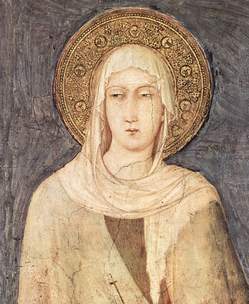
Prayer is an exercise of love and it would be incorrect to think that if there is no time for solitude, there is no prayer at all. For the very reason that prayer is based especially on love and springs from it, it is possible to prolong it beyond the time devoted exclusively to it.
Though it is not possible to be always thinking of God, partly because our mind gets tired, or because our many occupations demand full attention, still it is always possible for the heart to love and to desire God, and this can, and must, exist even in the performance of duties which absorb our intellect; in fact, such an orientation can be intensified by the desire to accomplish every action for the love of God, to please him, and give him glory.
"The reason for prayer" according to St. Thomas Aquinas, "is a desire moved by charity. . . And this desire with us must be continuous, either in act, or at least potentially. . . We can say that one prays continuously by reason of the continuity of his desire".
Divine Intimacy
Father Gabriel of Saint Mary Magdalen, OCD
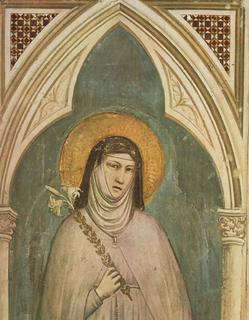
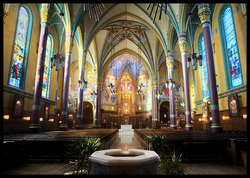 Utah's Catholics are celebrating a 100 years of the Catholic cathedral's presence in a state long known as a haven for Mormons. The mother church of the diocese, The Cathedral of the Madeleine, is 100 years old. While history shows us that Franciscan missionaries preached and celebrated Mass as early as 1776, this celebration concretizes a presence in a house of prayer that has celebrated the sacraments unto salvation.
Utah's Catholics are celebrating a 100 years of the Catholic cathedral's presence in a state long known as a haven for Mormons. The mother church of the diocese, The Cathedral of the Madeleine, is 100 years old. While history shows us that Franciscan missionaries preached and celebrated Mass as early as 1776, this celebration concretizes a presence in a house of prayer that has celebrated the sacraments unto salvation.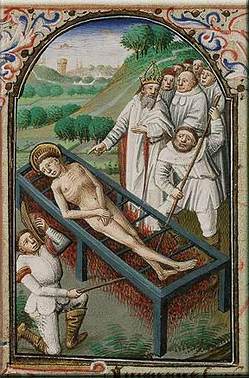
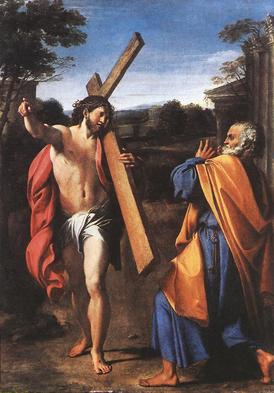
 God our Father, You give us joy each year in honoring the memory of Saint Teresa Benedicta of the Cross. May her prayers be a source of help for us, and may her example of courage and chastity be our inspiration.
God our Father, You give us joy each year in honoring the memory of Saint Teresa Benedicta of the Cross. May her prayers be a source of help for us, and may her example of courage and chastity be our inspiration.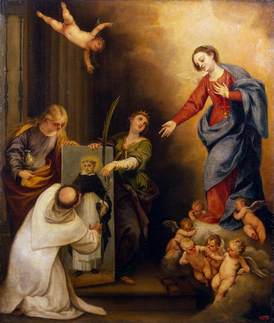
Not with show of worldly learning,
But with fervor of our faith
Open hearts to Spirit's yearning.
Christ alone be ever knowing,
And Him crucified be showing.
Dominic, called by the Lord,
Preaching, teaching, daily blessing,
Living poor and common life,
Contemplation's fruit expressing;
Thus he formed his Preachers boldly,
Showing graces manifoldly.
God the blessed Three in One,
Love beyond all human telling,
Father, Son, and Spirit blest,
Throned in heav'n and with us dwelling,
With the Word of Truth now feed us,
In Your holy ways now lead us.
78 78 88
suggested tune: Liebster Jesu
James Michael Thompson, (c) 2009, World Library Publications
In this context, the theme of integral human development takes on an even broader range of meanings: the correlation between its multiple elements requires a commitment to foster the interaction of the different levels of human knowledge in order to promote the authentic development of peoples. Often it is thought that development, or the socio-economic measures that go with it, merely require to be implemented through joint action. This joint action, however, needs to be given direction, because "all social action involves a doctrine". In view of the complexity of the issues, it is obvious that the various disciplines have to work together through an orderly interdisciplinary exchange. Charity does not exclude knowledge, but rather requires, promotes, and animates it from within. Knowledge is never purely the work of the intellect. It can certainly be reduced to calculation and experiment, but if it aspires to be wisdom capable of directing man in the light of his first beginnings and his final ends, it must be "seasoned" with the "salt" of charity. Deeds without knowledge are blind, and knowledge without love is sterile. Indeed, "the individual who is animated by true charity labours skilfully to discover the causes of misery, to find the means to combat it, to overcome it resolutely." Faced with the phenomena that lie before us, charity in truth requires first of all that we know and understand, acknowledging and respecting the specific competence of every level of knowledge. Charity is not an added extra, like an appendix to work already concluded in each of the various disciplines: it engages them in dialogue from the very beginning. The demands of love do not contradict those of reason. Human knowledge is insufficient and the conclusions of science cannot indicate by themselves the path towards integral human development. There is always a need to push further ahead: this is what is required by charity in truth. Going beyond, however, never means prescinding from the conclusions of reason, nor contradicting its results. Intelligence and love are not in separate compartments: love is rich in intelligence and intelligence is full of love.
This means that moral evaluation and scientific research must go hand in hand, and that charity must animate them in a harmonious interdisciplinary whole, marked by unity and distinction. The Church's social doctrine, which has "an important interdisciplinary dimension", can exercise, in this perspective, a function of extraordinary effectiveness. It allows faith, theology, metaphysics and science to come together in a collaborative effort in the service of humanity. It is here above all that the Church's social doctrine displays its dimension of wisdom. Paul VI had seen clearly that among the causes of underdevelopment there is a lack of wisdom and reflection, a lack of thinking capable of formulating a guiding synthesis for which "a clear vision of all economic, social, cultural and spiritual aspects" is required. The excessive segmentation of knowledge, the rejection of metaphysics by the human sciences, the difficulties encountered by dialogue between science and theology are damaging not only to the development of knowledge, but also to the development of peoples, because these things make it harder to see the integral good of man in its various dimensions. The "broadening [of] our concept of reason and its application" is indispensable if we are to succeed in adequately weighing all the elements involved in the question of development and in the solution of socio-economic problems.
(Caritas in veritate, 30-31; emphasis mine)
Since 1908 the Church has called upon us to join in prayer with other Christians around the world during the Week of Prayer for Christian Unity. We do this work of prayer as an education in hope for spiritual and actual Christian unity realizing that the Holy Spirit is the only one capable of bring unity among various groups of Christians. The proposal for a week of prayer was initiated in the USA by Franciscans of the Atonement Father Paul Wattson and it is held from January 18 - 25. Today the observance is international in scope.
It is generally held that the 1910 World Mission Conference in Edinburgh, Scotland, marked the beginnings of the modern ecumenical movement.
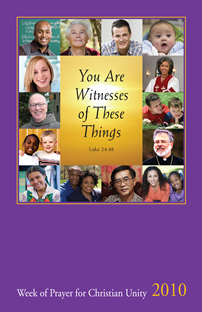
In tribute, the promoters of the Week of Prayer for Christian Unity, the Commission on Faith and Order and the Pontifical Council for Promoting Christian Unity, invited the Scottish churches to prepare this year's theme. They suggested: "You are witnesses of these things" (Luke 24:48).
The 2010 theme is a reminder that as the community of faith those reconciled with God and in Christ, "You are witness of these things"--witness to the truth of the power of salvation in Jesus Christ who will also make real his prayer, "That all may be one...so the world may believe." *Witness gives praise to the Presence who gives us the gift of life and resurrection; by knowing how to share the story of our faith with others; by recognizing that God is at work in our lives; by giving thanks for the faith we have received; by confessing Christ's victory over all suffering; by seeking to always be more faithful to the Word of God; by growing in faith, hope and love; and by offering hospitality and knowing how to receive it when it is offered to us.
Materials to observe the Week of Prayer for Christian Unity are available from the Graymoor Ecumenical and Interreligious Institute, a ministry of the Franciscan Friars of the Atonement.
For more information visit www.geii.org
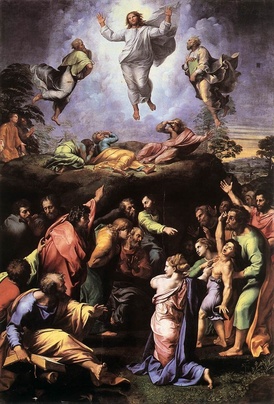
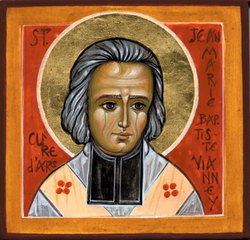
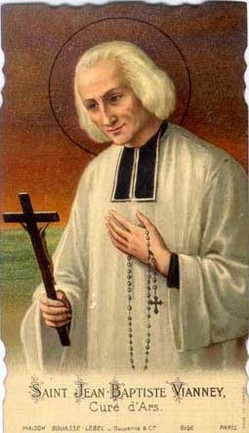 Sing the God of awesome wisdom
Sing the God of awesome wisdomWho has chosen for his own
Those of ev'ry age and nation
To hold fast to God alone
Through all changing styles and customs,
Hearts that only Christ enthrone.
In a faithless time of torpor,
John Vianney loved the Lord,
Preached the truth with ceaseless fervor,
Led his flock by deed and word,
And by his example fearless
Caused our God to be adored.
Lovingly he coaxed the sinner
To submit to Jesus' way;
In humility and patience
To his Lord he knelt to pray
And, obedient to his calling,
Lived his teaching ev'ry day.
To the Trinity give glory,
Father, Son, and Paraclete:
Those on earth with those in heaven
Joining in one anthem sweet:
As the saints on earth gave witness,
Let us each our course complete!
87 87 87
PICARDY, ST. THOMAS
James Michael Thompson (c) 2009, World Library Publications
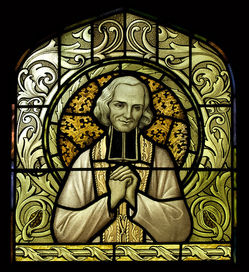
"O my God, come to me, so that You may dwell in me and I may dwell in you."
Father of mercy, you made Saint John Vianney outstanding in his priestly zeal and concern for your people. By his example and prayers, enable us to win our brothers and sisters to the love of Christ and come with them to eternal glory.
Pope Benedict's letter proclaiming the Year of the Priest for the 150th year of Saint John Vianney's death
A Litany in Honor of Saint John Vianney
A brief biography of Vianney
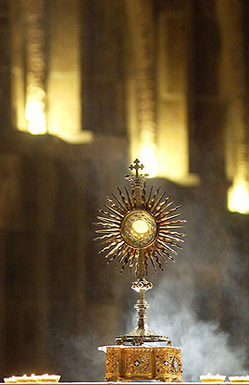
After a 40-year absence, the practice of perpetual adoration
of the Blessed Sacrament has returned to the Archdiocese of Boston. This is
another positive response to Pope Benedict's calling for a Year of the Priest
and a desire to intimately know the Lord.
In Ecclesia de Eucharistia, Pope John Paul told us that:
It is pleasant to spend time with him [Christ], to lie close to his breast like the Beloved Disciple (cf. Jn 13:25) and to feel the infinite love present in his heart. If in our time Christians must be distinguished above all by the "art of prayer", how can we not feel a renewed need to spend time in spiritual converse, in silent adoration, in heartfelt love before Christ present in the Most Holy Sacrament? How often, dear brother and sisters, have I experienced this, and drawn from it strength, consolation and support! This practice, repeatedly praised and recommended by the Magisterium, is supported by the example of many saints. Particularly outstanding in this regard was Saint Alphonsus Liguori, who wrote: "Of all devotions, that of adoring Jesus in the Blessed Sacrament is the greatest after the sacraments, the one dearest to God and the one most helpful to us". The Eucharist is a priceless treasure: by not only celebrating it but also by praying before it outside of Mass we are enabled to make contact with the very wellspring of grace. A Christian community desirous of contemplating the face of Christ in the spirit which I proposed in the Apostolic Letters Novo Millennio Ineunte and Rosarium Virginis Mariae cannot fail also to develop this aspect of Eucharistic worship, which prolongs and increases the fruits of our communion in the body and blood of the Lord.
In Mane Nobiscum Domine we read: "Our faith in the God who took flesh in order to become our companion along the way needs to be everywhere proclaimed, especially in our streets and homes, as an expression of our grateful love and as an inexhaustible source of blessings." So the liturgical practice of adoration of the Blessed Sacrament deepens the heart's desire "to cultivate a lively awareness of Christ's real presence" (18).
Get the point? Adoration of the Eucharistic face of the Lord awakens in us something new, something beautiful.
Officially Boston's Eucharistic adoration begins with the Sacrifice of the Mass on August 15 celebrated by Cardinal Sean O'Malley, OFM Cap.
Visit website for the Saint Clement Shrine
"O taste and see the goodness of the Lord." (Psalm 34)
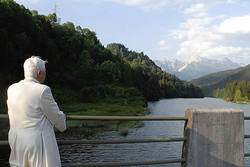 Have you ever considered what a 21st century theology
of creation would look like? What experts would you follow? Would you ever
think of Pope Benedict as a green pope? Could the leader of the 1 billion plus
Catholics lead the charge in standing on the side the culture of life AND the
environment? As Benedict's ministry as the Supreme Pontiff unfolds so is his
vision of what humanity is as gift of God and our responsibility to care for
it. Pope Benedict is offering us a way of being environmentally conscious that
is coherent with faith and reason. As he said in July 2007, "Our earth speaks to us, and we must listen if we
want to survive." In his recent letter to the world, Caritas
in Veritate, Pope Benedict wrote: "When nature, including the human being, is
viewed as the result of mere chance or evolutionary determinism, our sense of
responsibility wanes. In nature, the believer recognizes the wonderful result
of God's creative activity, which we may use responsibly to satisfy our
legitimate needs, material or otherwise, while respecting the intrinsic balance
of creation. If this vision is lost, we end up either considering nature an
untouchable taboo or, on the contrary, abusing it." Read John Allen's analysis.
Have you ever considered what a 21st century theology
of creation would look like? What experts would you follow? Would you ever
think of Pope Benedict as a green pope? Could the leader of the 1 billion plus
Catholics lead the charge in standing on the side the culture of life AND the
environment? As Benedict's ministry as the Supreme Pontiff unfolds so is his
vision of what humanity is as gift of God and our responsibility to care for
it. Pope Benedict is offering us a way of being environmentally conscious that
is coherent with faith and reason. As he said in July 2007, "Our earth speaks to us, and we must listen if we
want to survive." In his recent letter to the world, Caritas
in Veritate, Pope Benedict wrote: "When nature, including the human being, is
viewed as the result of mere chance or evolutionary determinism, our sense of
responsibility wanes. In nature, the believer recognizes the wonderful result
of God's creative activity, which we may use responsibly to satisfy our
legitimate needs, material or otherwise, while respecting the intrinsic balance
of creation. If this vision is lost, we end up either considering nature an
untouchable taboo or, on the contrary, abusing it." Read John Allen's analysis.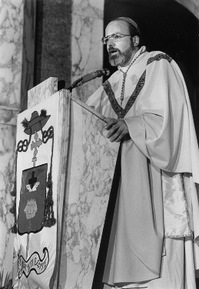 25 years ago Capuchin Father Sean Patrick O'Malley was ordained a bishop. Currently he's the cardinal-archbishop of Boston but not before periods of episcopal ministry in the US Virgin Islands, Fall River, Palm Beach.
25 years ago Capuchin Father Sean Patrick O'Malley was ordained a bishop. Currently he's the cardinal-archbishop of Boston but not before periods of episcopal ministry in the US Virgin Islands, Fall River, Palm Beach.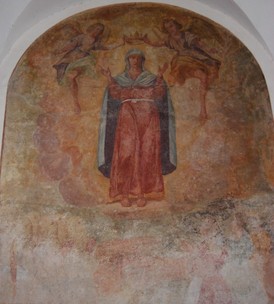
Today is the feast of Our Lady of the Angels of the
Portiuncula, the Virgin under whose mantle Saint Francis of Assisi
was wrapped; Mary's maternal protection made it possible for blessed Francis to
experience an intentse Presence of the Lord and to receive his vocation to
rebuild the Church. The Portiuncula is also the place where Francis knew first
hand the experience of being sustained by the Angels. Likewise his intimate
devotion to the Blessed Mother, under whose protection did he place himself to
do the Lord's work did this place become holy for the members of the Franciscan
family and for the Church universal. As a place of pilgrimage, the holy Portiuncula is a poignant
reminder of how important the encounter with Christ was for Saint Francis and how
much the encounter ought to be pivotal for us today. Without meeting Christ,
little makes sense. Saint Bonaventure had this to say about this devotion:
The Portiuncula was an old church dedicated to the Virgin
Mother of God which was abandoned. Francis had great devotion to the Queen of
the world and when he saw that the church was deserted, he began to live there
constantly in order to repair it. He heard that the Angels often visited it, so
that it was called Saint Mary of the Angels, and he decided to stay there
permanently out of reverence for the angels and love for the Mother of Christ. This is also the place where St Clare took her vows and where Saint Francis died.
Consider the words of an early biographer of Saint Francis
of Assisi:
From there he moved to another place, which is called the
"Portiuncula," where there stood a church of the Blessed Virgin
Mother of God built in ancient times. At that time it was deserted and no
one was taking care of it. When the holy man of God saw it so ruined, he
was moved by piety because he had a warm devotion to the Mother of all good and
he began to stay there continually. The restoration of that church took place
in the third year of his conversion. At this time he wore a sort of hermit's
habit with a leather belt. He carried a staff in his hand and wore shoes. One
day the gospel was being read in that church about how the Lord sent out his
disciples to preach. The holy man of God, who was attending there, in order to
understand better the words of the gospel, humbly begged the priest after
celebrating the solemnities of the Mass to explain the gospel to him. The
priest explained it all to him thoroughly line by line. When he heard
that Christ's disciples should not possess gold or silver or money, or carry on
their journey a wallet or a sack, nor bread nor a staff, not to have shoes nor
two tunics, but that they should preach the kingdom of God and penance, the
holy man, Francis immediately exulted in the spirit of God. "This is what
I want," he said, "this is what I seek, this is what I desire with
all my heart." The holy father, overflowing with joy, hastened to
implement the words of salvation, and did not delay before he devoutly began to
put into effect what he heard. (From The Life of Saint Francis by Thomas
of Celano)
Read about and perhaps seek The
Portiuncula Indulgence if you visit any Franciscan Church and
observe the conditions for receiving the indulgence.
The Holy Father made reference to this in his Sunday Angelus
address:
... today is the feast of the "Pardon of Assisi,"
which St. Francis obtained from Pope Honorious III in the year 1216, after
having a vision while he was praying in the little church of the Portiuncula.
Jesus appeared to him in his glory, with the Virgin Mary on his right and
surrounded by many Angels. They asked him to express a wish and Francis
implored a "full and generous pardon" for all those who would visit
that church who "repented and confessed their sins". Having received
papal approval, the Saint did not wait for any written document but hastened to
Assisi and when he reached the Portiuncula announced the good news:
"Friends, the Lord wants to have us all in Heaven!". Since then, from
noon on 1 August to midnight on the second, it has been possible to obtain, on
the usual conditions, a Plenary Indulgence, also for the dead, on visiting a
parish church or a Franciscan one.
A note about indulgences, which are often
misunderstood. Indulgences are not forgiveness for sin but forgiveness
for temporal punishment due to sin; that the residual effects of sin are
forgiven.
Also, visit The Shrine website (read
in 3 languages)
On this feast we pray
August Queen of Heaven, sovereign queen of Angels, you who
at the beginning received from God the power and the mission to crush the head
of Satan, we beseech you humbly, send your holy legions so that, on your orders
and by your power, they will track down demons, fight them everywhere, curb
their audacity and plunge them into the hell.
Who can be compared to God? Oh good and tender Mother, you
will always be our love and our hope. Oh divine Mother, send the Holy Angels
and Archangels to defend me and to keep the cruel enemy far from me. Holy
Angels and Archangels defend us, protect us. Amen.
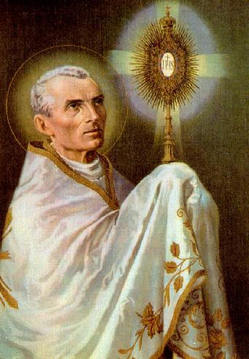
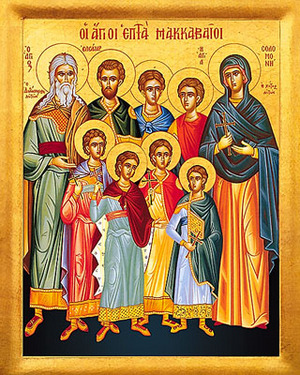 The very hairs of your head are all numbered. Therefore do not be afraid; you are of more value than many sparrows.
The very hairs of your head are all numbered. Therefore do not be afraid; you are of more value than many sparrows.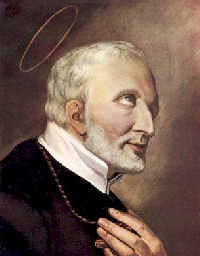
You are the salt of the earth; but if salt has lost its taste, how shall its saltness be restored? It is no longer good for anything except to be thrown out and trodden under foot by men.
Father, you constantly build up your Church by the lives of your saints. Give us the grace to follow Saint Alphonsus in his loving concern for the salvation of men, and so come to share his reward in heaven.
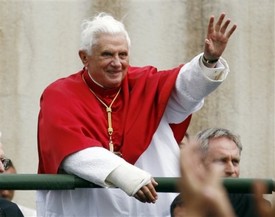 The Holy Father's prayer intentions for the month of August:
The Holy Father's prayer intentions for the month of August:
